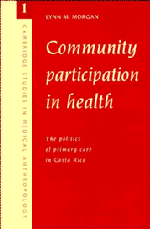Book contents
- Frontmatter
- Contents
- List of illustrations
- List of tables
- Acknowledgments
- List of abbreviations
- 1 The political symbolism of health
- 2 Banana medicine: the United Fruit Company in Costa Rica
- 3 The international imperative: foreign aid for health in Costa Rica
- 4 The primary health care movement and the political ideology of participation in health
- 5 Participation in Costa Rica: dissent within the state
- 6 La Chira: participation in a banana-growing community
- 7 The political economy of participation
- References
- Index
5 - Participation in Costa Rica: dissent within the state
Published online by Cambridge University Press: 29 January 2010
- Frontmatter
- Contents
- List of illustrations
- List of tables
- Acknowledgments
- List of abbreviations
- 1 The political symbolism of health
- 2 Banana medicine: the United Fruit Company in Costa Rica
- 3 The international imperative: foreign aid for health in Costa Rica
- 4 The primary health care movement and the political ideology of participation in health
- 5 Participation in Costa Rica: dissent within the state
- 6 La Chira: participation in a banana-growing community
- 7 The political economy of participation
- References
- Index
Summary
A select history of state-sponsored health care in Costa Rica
State sponsorship of health and medical care programs was not a feature of Costa Rican society until the 1920s. Before then, health services for most of the population were provided by a few doctors and many traditional healers. The only organized health care available in the country was associated with the two major export crops: bananas and coffee. In the banana-growing enclaves on the coasts, the United Fruit Company offered medical services under an early “tropical occupational health” program designed to keep bananas supplied to foreign markets. In the coffee-growing highlands, disease control and curative efforts assisted by the Rockefeller Foundation kept coffee pickers healthy. Health care was thus offered through Costa Rica's major landowners and their foreign allies, who considered medical services a necessary economic investment. The state did not assume responsibility for health care, nor was health considered a right.
In 1850 Costa Rica was a poor and sparsely populated country beginning to find its niche in the world economic market. Coffee exports had begun around 1830, and European demand for coffee was leading to higher production. Land concentration began during this time as a coffee-growing landed elite took increasing control over commercial and political life, while subsistence farmers lost their lands and were forced to become coffee pickers (Seligson 1980). Before the 1830s there had been considerable social differentiation which led, with the growth of coffee exports, to social conflict between “on the one hand, the processorexporter- financier elite and its commercial capital, and, on the other, the smallholding cultivators beginning the long historical process of capital differentiation in agriculture” (Gudmundson 1986: 54).
- Type
- Chapter
- Information
- Community Participation in HealthThe Politics of Primary Care in Costa Rica, pp. 83 - 118Publisher: Cambridge University PressPrint publication year: 1993



